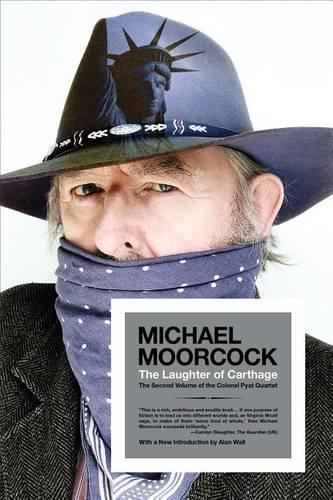
The Laughter Of Carthage: The Second Volume of the Colonel Pyat Quartet
(Paperback)
Publishing Details
The Laughter Of Carthage: The Second Volume of the Colonel Pyat Quartet
By (Author) Michael Moorcock
PM Press
PM Press
11th January 2013
United States
Classifications
General
Fiction
823.914
Physical Properties
Paperback
538
Width 152mm, Height 228mm
772g
Description
Maxim Arturovitch Pyatnitski, that charming but despicable mythomaniac who first appeared in Byzantium Endures (PM Press, 2012, available from Turnaround), is back. Having fled Bolshevik Russia in late 1919, Pyat's progress is a series of leaps from crisis to crisis, as he begins affairs with a Baroness and a Greek prostitute while undertaking schemes to build flying machines in Europe and the United States. His devotion to flamboyantly racist, particularly anti-Semitic doctrines - like his devotion to cocaine - remains unabated. Pyat remains one of literature's great anti-heroes.
Reviews
"Michael Moorcock is an absolute wizard of a storyteller. I can think of no writer like him, not here, not America. He is a wonder...it is marvelous to meet a novelist who has the energy for the epic. It is not simply a case of energy, Mr. Moorcock is also a storyteller, an old-fashioned button-holing, nineteenth-century storyteller."
--Stanley Reynolds, Punch
"This is a rich, ambitious and erudite book.... If one purpose of fiction is to lead us into different worlds and, as Virginia Woolf says, to make of them 'some kind of whole, ' then Michael Moorcock succeeds brilliantly."
--Carolyn Slaughter, The Guardian
"The Laughter of Carthage and its companion volumes will be seen... as an imaginative record of our own time rather than as a simple reconstruction of that which has gone."
--Peter Ackroyd, The Sunday Times
"The Laughter of Carthage is a formidable work in which science and technology are subordinated to narrative techniques not usually found in popular fiction... a work of grand design... cast as Pyatnitski's memoirs of a life uprooted by the Russian Revolution. He brags of his exploits as a Don Cossack; he claims pure Russian blood and a batch of patents for airplanes and automobiles. But one can never be sure that anything Pyatnitski says is true. He is certainly an egomaniac and very likely mad; he is also a reactionary Tom Swift, an anti-Semite, a sybarite and a paranoiac with a gargantuan appetite for cocaine. Rabid anti-Semitism is his way of denying the past and advancing his career as scientist and gentleman. There is also ample indication of a thin line between deceit and self-delusion. Pyat's first stop on his flight from Bolshevism is Istanbul, a teeming cosmopolis of thieves and whores but also a site idealized as the bastion of a once glorious Christendom. From there, the grotesque innocent moves west through Rome, Paris, New York City and Hollywood. Moorcock takes large risks... there are rewarding detours: lush descriptions of landscapes and the world's great cities, and a parade of characters that would feel at home in the novels of Dickens, Nabokov and Henry Miller."
--TIME
Author Bio
Michael Moorcock is an award-winning author of more than 80 works of fiction and nonfiction, including The Cornelius Quartet, Doctor Who, and Elric: The Stealer of Souls. He has received the Nebula, World Fantasy, and British Science Fiction awards and is a Grandmaster of the Science Fiction and Fantasy Writers of America. His nonfiction has appeared in Financial Times, the Guardian, and the Los Angeles Times. He lives in Bastrop, Texas. Alan Wall is a novelist, a short story writer, a poet, an essayist, and a professor of writing and literature at the University of Chester. His novels include Bless the Thief, China, The Lightning Cage, The School of Night, and Sylvie's Riddle.
